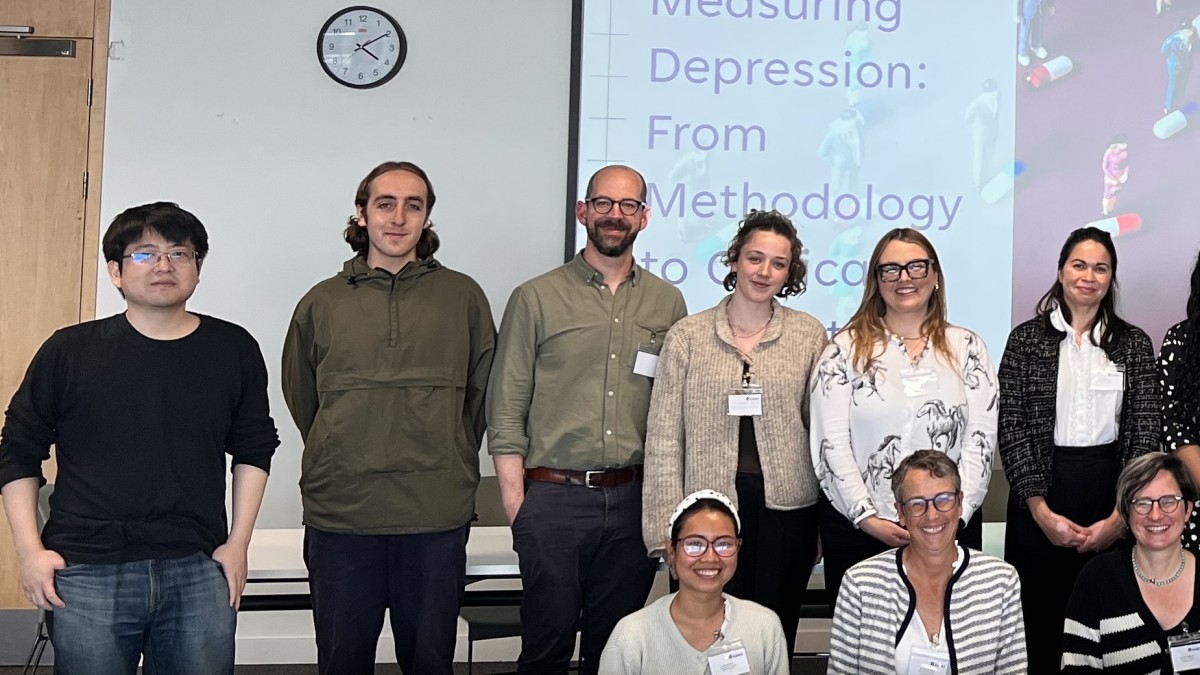Rethinking depression: measurement, diagnosis and the role of lived experience
By Drs Lydia Poole, Mel Ramasawmy, Andrea Martinez and Rose Rickford
How do we define depression – and more importantly, are we getting it right?
This was the central question at ‘Measuring Depression: From Methodology to Clinical Application’, a recent workshop hosted at the University of Surrey that brought together academics, early career researchers, clinicians, and people with lived experience to critically reflect on how depression is measured and diagnosed. Across the day, one message came through clearly: depression is more complex than current diagnostic approaches allow for.
The trouble with diagnostic tools
Many discussions centred on the limitations of standard diagnostic frameworks, particularly the DSM-5 criteria for major depressive disorder. While useful for consistency, these checklists often fail to reflect the diverse, personal and context-dependent ways in which depression is experienced. Participants noted that relying on symptom counts over a two-week period can lead to over- or under-diagnosis, depending on how distress is expressed or interpreted. In addition, speakers argued that the lack of a coherent theory of depression means that depression is defined, in research and practice, according to a list of symptoms, but with inadequate understanding of whether and how these symptoms relate to a single underlying condition.
This issue becomes even more pressing in research contexts. Longitudinal studies, for example, often rely on tools like the Patient Health Questionnaire (PHQ-9) or CES-D to track depression over time. However, these tools don’t always identify the same individuals as being depressed—raising concerns about validity, comparability and the stories we might be missing. There was widespread agreement on the need for more dimensional, rather than strictly categorical, models of depression that account for symptom severity, duration and variation across individuals.
Listening to lived experience
One of the most powerful parts of the event was the inclusion of patient and public involvement (PPI) contributors. Their reflections underscored the emotional weight and sometimes alienating nature of clinical assessments. Several described feeling unheard or misunderstood – particularly when their complex life histories, traumas or personal circumstances didn’t fit neatly into diagnostic boxes.
Concerns about confidentiality, stigma and cultural misunderstanding were also raised. These voices highlighted an urgent need for more patient-centred, trauma-informed approaches – both in clinical practice and in research design.
Clinical realities and challenges
Another key theme was the role of GPs in diagnosing and managing depression. With limited time and resources, GPs can rely on brief screening tools alongside clinical judgement. But this can blur the line between clinical depression and broader emotional distress caused by life events. Participants called for more clarity in distinguishing between temporary sadness and persistent, impairing mood disorders – echoing long-standing debates in mental healthcare about the risks of over-medicalisation.
Participants highlighted that the context in which depression screening tools are used is key to their potential effectiveness, and that using them in contexts for which they are not designed raises concerns about validity. For example, the PHQ-9 is used in the NHS to monitor recovery from depression, but it was not designed for this purpose. Speakers with lived experience described an alienating experience when tools were used inappropriately and outside of an interaction with a skilled clinician.
Cultural competency and the limits of ‘neutral’ tools
Cultural context also matters. Presenters explored how standard screening measures may not translate across cultural groups, with a focus on individuals from South Asian backgrounds. Language, stigma and cultural understandings of mental health all influence how symptoms are reported and perceived. Insights from the ongoing PAPER study supported the idea that psychiatric assessments are never culturally neutral – and should be interpreted through a sociocultural lens.
A call for change
What emerged across all sessions was a shared commitment to moving beyond rigid diagnostic frameworks. There was a strong call for more flexible, context-sensitive and inclusive approaches that recognise the diversity of depressive experiences. Interdisciplinary collaboration, meaningful involvement of people with lived experience, and a willingness to revisit established tools and assumptions were seen as essential to improving both research and clinical care.
What’s next?
While the event wasn’t designed to produce immediate outputs, it has had a significant impact on the direction of our ongoing research – particularly within the PAPER study. We’ll be drawing on these insights to shape upcoming publications, improve our theoretical frameworks and ensure that our research is more reflective of real-world complexities.
In particular, we’re committed to:
- Exploring dimensional models of depression that allow for greater nuance
- Embedding lived experience throughout our research process
- Developing more culturally competent approaches to assessment
- Addressing diagnostic inconsistencies and the blurred boundaries between distress and disorder.
As one attendee put it: “I’ve come out feeling quite different and motivated about how we think about applied depression research.”
We couldn’t agree more.
Acknowledgements
With thanks to the Institute of Advanced Studies at the University of Surrey for funding the event, and to our PPI contributors for their powerful and generous contributions.
Related sustainable development goals





